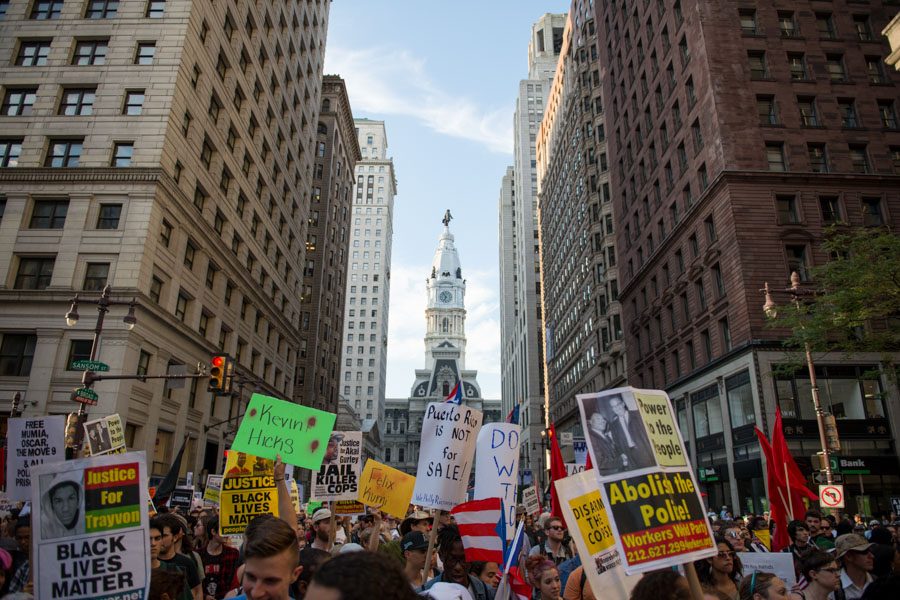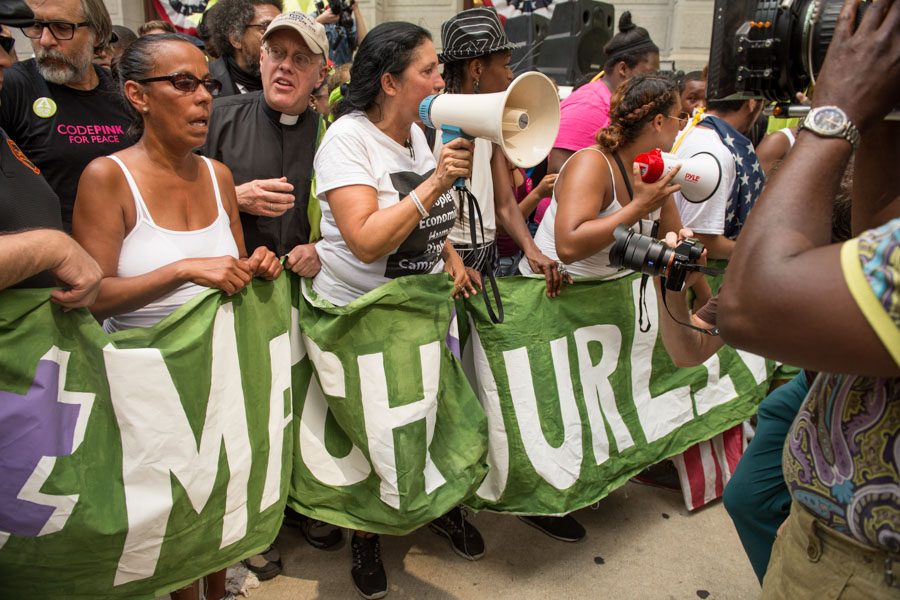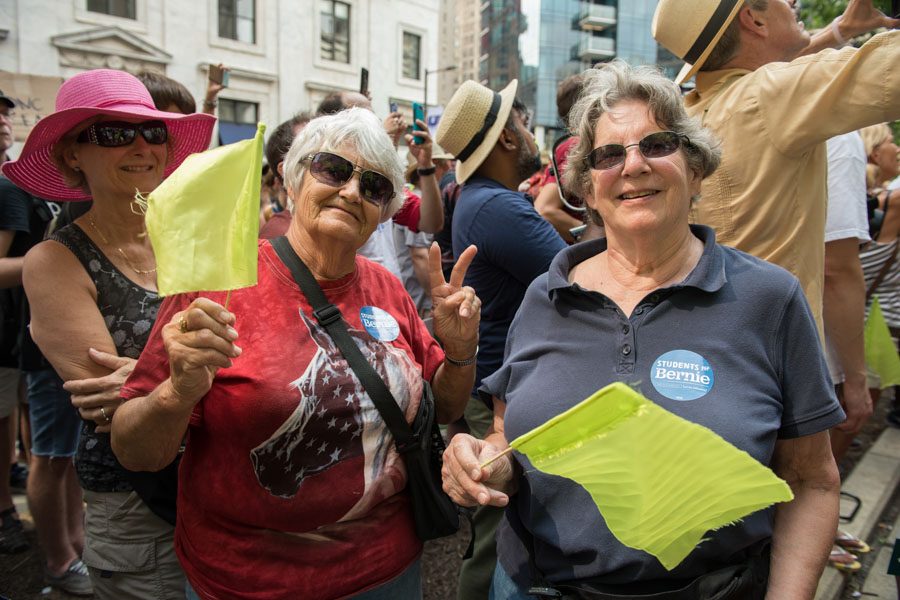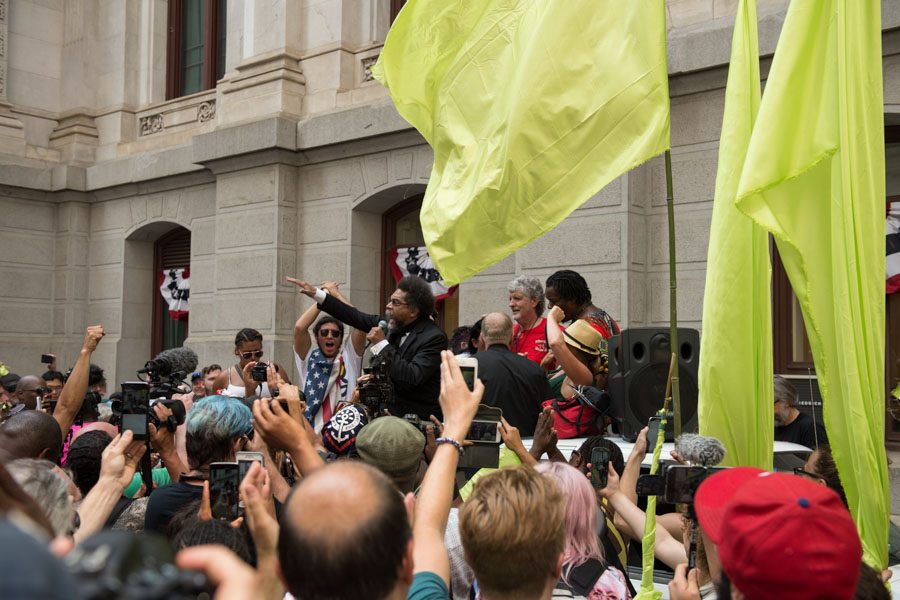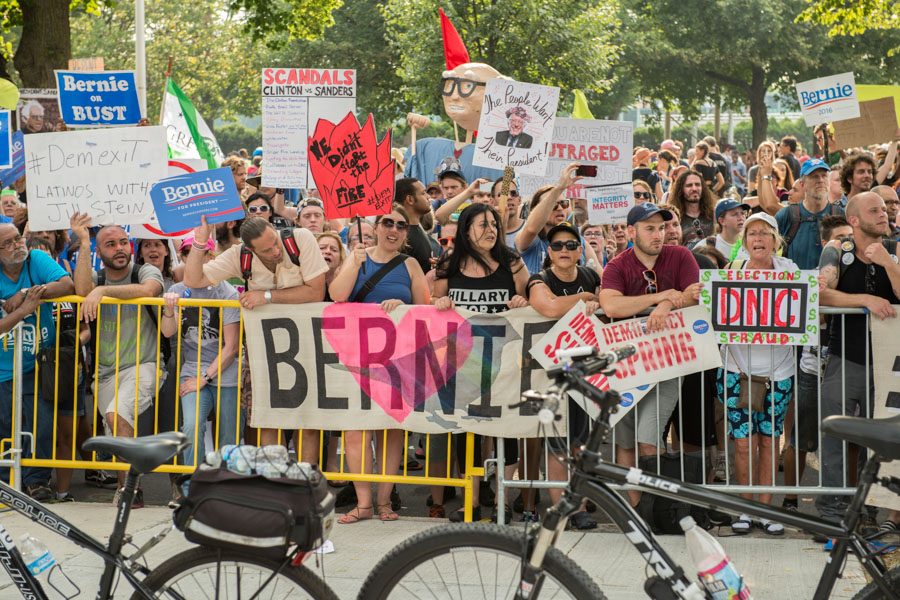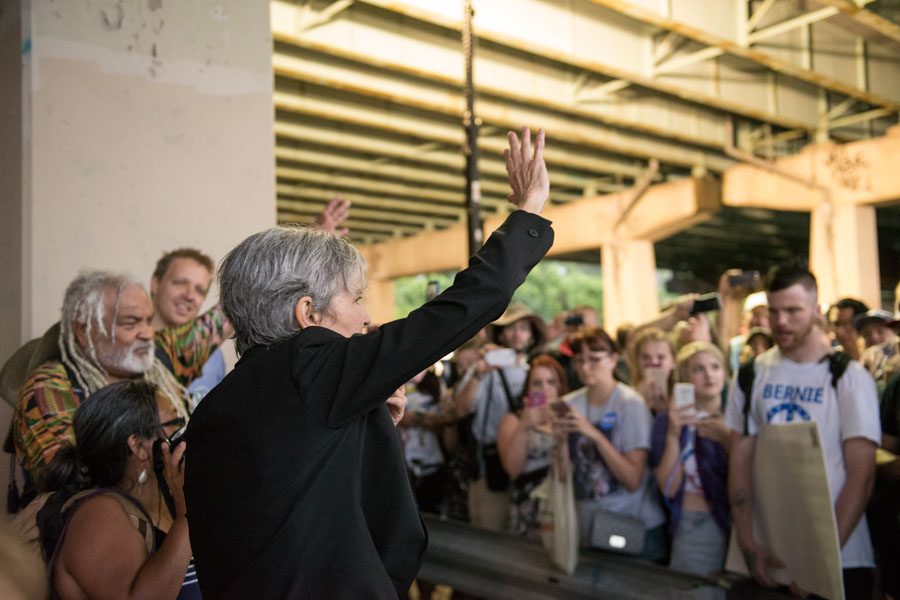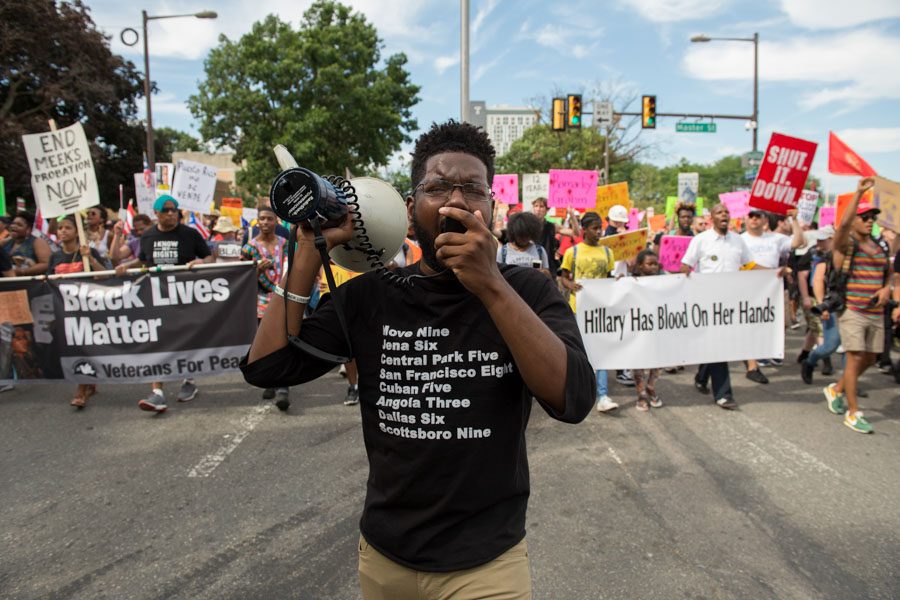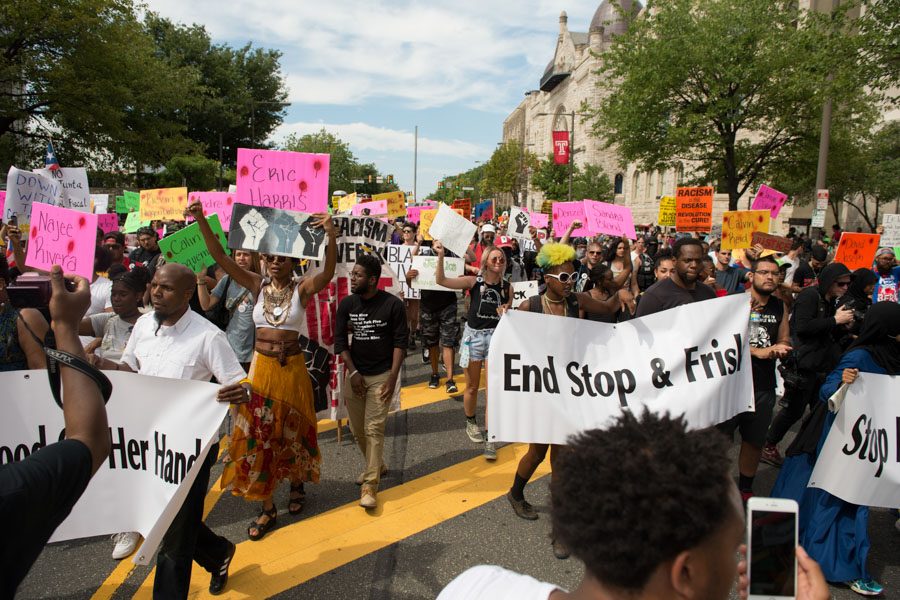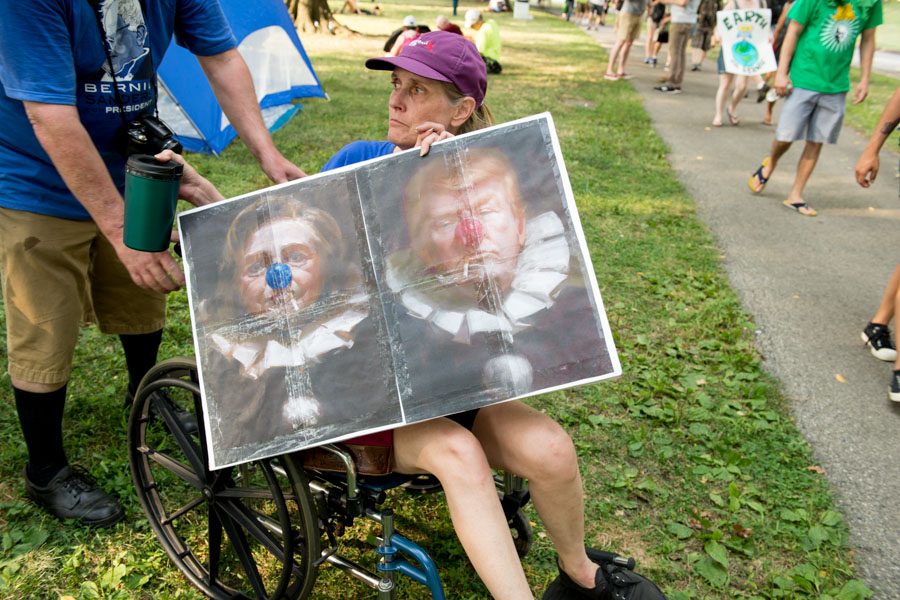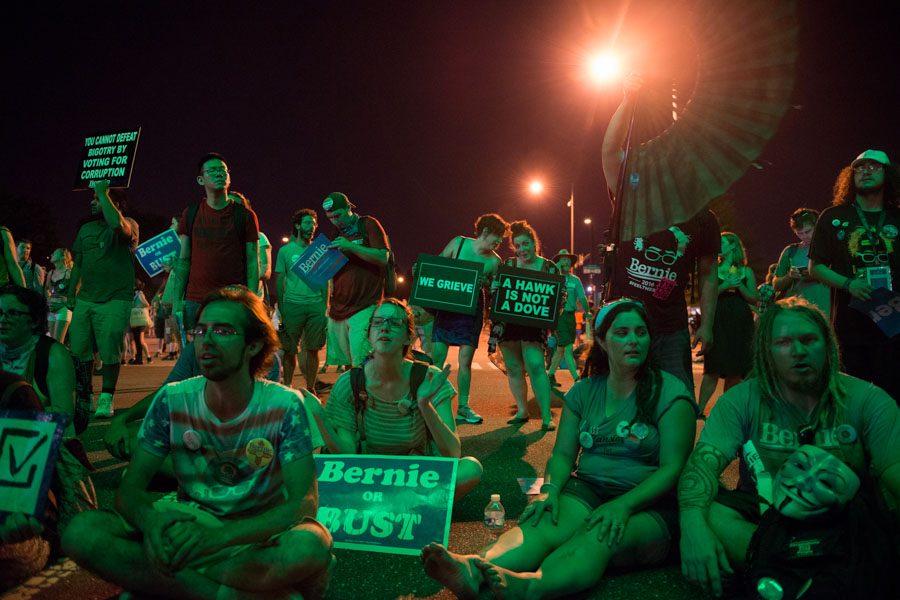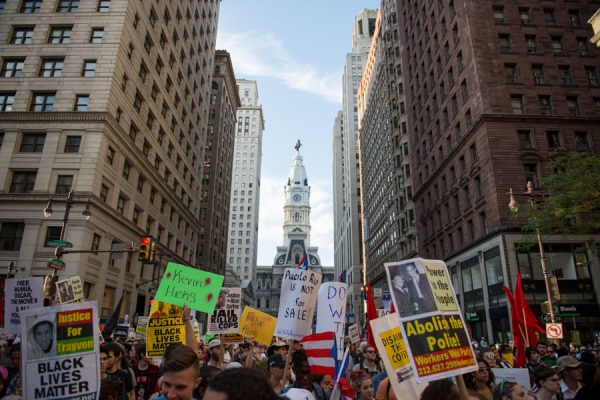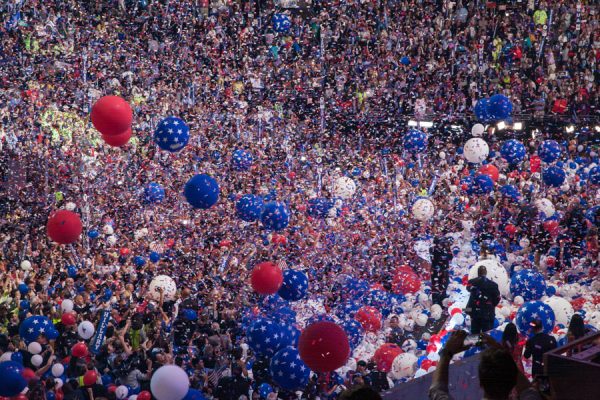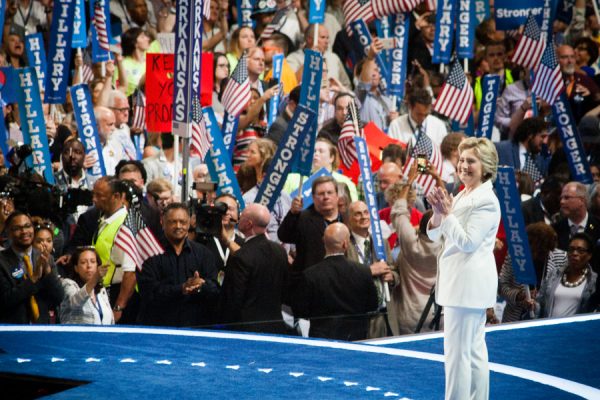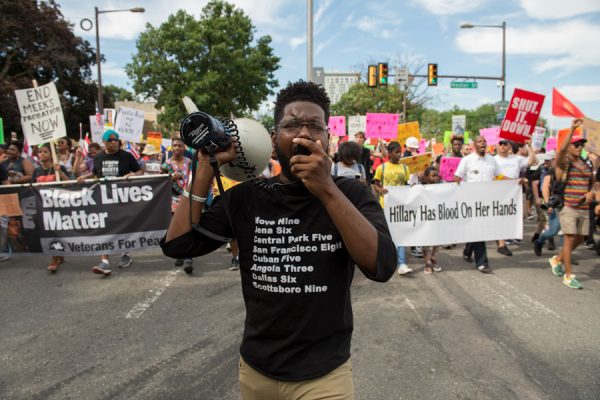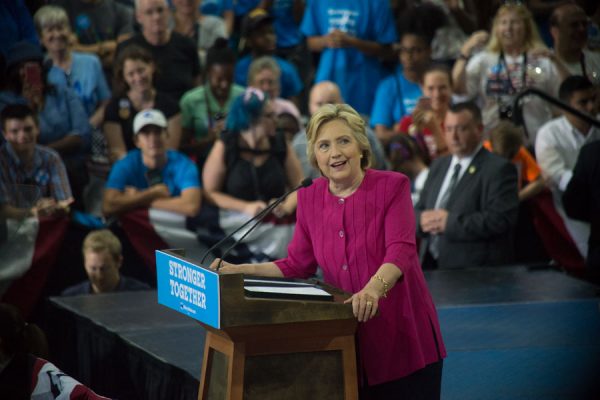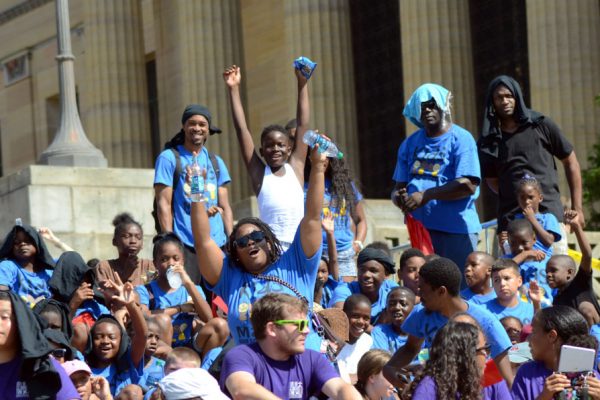DNC Protest Recap: Notes from the “March of Our Lives” and “Shut Down the DNC”
The Democratic National Convention (DNC) took over Philadelphia last week. While the speeches and soaring rhetoric inside the Wells Fargo Center focused on a positive image of America and the motto of “Stronger Together,” those protesting in the streets were not buying the party’s call for unity. Appeals to unite protesters in fear of Republican nominee Donald Trump fell on deaf ears as a number of activist groups marched down Broad Street in opposition to the DNC and its nominee, Hillary Clinton.
The March For Our Lives
The first large protest against the DNC took place Monday, July 25. The demonstration was led by the Poor People’s Economic Human Rights Campaign (PPEHRC) under the leadership of Kensington-based activist Cheri Honkala.
Honkala did not mince words when describing her disdain for the Democratic Party to the sea of protesters who gathered under the steps of City Hall before the “March for Our Lives” was set to begin.
“The Democrats cannot hold the guns of racism and fascism to our heads. You must earn our vote,” Honkala said. Honkala believes the amount of money and resources used by the city in hosting the DNC was hypocritical and unacceptable, “as long as the city fails to provide for its most vulnerable citizens.”
Information regarding the DNC Host Committee’s fundraising has been kept out of the public’s eye. According to the Los Angeles Times, Dustin Slaughter, a freelance journalist and publisher of the Philly-based investigative news website The Declaration, filed an open records request to obtain a list of organizations funding the DNC.
According to the LA Times,
“On June 14, the Pennsylvania Office of Open Records ruled that the host committee was required to disclose its list of donor records immediately, but it refused to comply. Ed Rendell and company have insisted that they will release the records only 60 days after the convention, as required by the Federal Election Commission.”
Slaughter is now challenging the DNC Host Committee’s appeal in court, which at this point has allowed the Host Committee to avoid disclosing those funding the event.
When Philadelphia hosted the Republican National Convention in 2000, a list of fundraisers and donors, which included a number of high-profile companies, was published weeks before the convention.
Those who were participating in the March For Our Lives also demanded an end to unemployment, hunger and homelessness, funds for education, a single payer health care system, affordable and accessible housing, living wages, and an end to the prison industrial complex.
Other protesters were marching in support of “Palestinian Human Rights.” The recognition of Palestinian rights and the “two state solution” had been denied by the DNC in the Democratic Party Platform.
While the protesters were walking around City Hall toward South Broad Street a number of the PPEHRC’s leaders attempted to push back the swarm of media gathered in front of protesters to frantically take pictures.
As the march began, with Honkala leading the pack, hundreds of activists began chanting slogans in unison such as “the people united will never be defeated” and “this is what democracy looks like.” The chants eventually became a clear rebuke of the Democratic nominee, “Hell no, DNC! We won’t vote for Hillary.”
@CornelWest and activists marching down Broad Street: "Hell No #DNC we won't vote for @HillaryClinton" #DNCinPHL pic.twitter.com/YKIxy7nhS1
— Spirit Newspapers (@TheSpiritNews) July 25, 2016
Another activist leading the March For Our Lives was Dr. Cornel West, a prominent university professor and civil rights activist. West had a hand in writing the Democratic Party Platform as a Bernie Sanders-appointed member to the Democratic Party Platform Drafting Committee. Following Sen. Sanders’ exit from the presidential race, West has thrown his support behind Dr. Jill Stein, the Green Party’s candidate for president.
“Sister Hillary Clinton is the Milli Vanilli of American Politics: She lipsyncs, but when it comes to policy, she supported the crime bill, she supported deregulation of banks and also pulled the rug out from under welfare,” West said. He also cited Clinton’s support of Israel as something that made him weary of what another Clinton administration could mean for global politics.
Despite the anger, Monday’s march was peaceful. No protesters directly confronted law enforcement officials. Officers walked and rode bikes dressed down in their blues, opting out of the riot gear seen a week prior at the Republican National Convention in Cleveland. Many political commentators saw this as an attempt to not provoke protesters already weary of militarized authority.
At one point, the March For Our Lives ran into another group of protesters that had camped under a light post that had the Mississippi State Flag hanging from it. The flag of Mississippi has a smaller version of the Confederate Flag within it. Protesters from both groups gathered together and chanted “take it down” for about ten minutes. Other activists attempted to devise a plan to climb up the lamp post and remove the flag.
Activists Chanting: "Take it Down" as Mississippi Confederate Flag hang from light post on Broad Street. #DNCinPHL pic.twitter.com/Pr0dMcnSHH
— Spirit Newspapers (@TheSpiritNews) July 25, 2016
When the march reached FDR Park, disenfranchised Sanders supporters who joined the March For Our Lives announced their displeasure with the Democratic Party and threw their support behind Stein.
“Bernie Sanders’ movement showed we cannot have a revolution inside of a counter revolutionary party,” one activist shouted to the crowd of protesters in FDR Park. “Jill Stein is a revolutionary candidate and she will not betray you ever.”
Protesters gathered under a small white tent as a Jill Stein rally began. A number prominent speakers supporting Stein and the revolutionary ideas of her party spoke during the rally, including Immortal Technique, Rosa Clemente, YahNe Ndgo, Howie Hawkins, Cheri Honkala, Mic Crenshaw, Mark Webber, Terese Palmer, Chris Hedges of Truthdig.com
As the speakers delivered their message to the hundreds of protesters huddled together, the weather turned for the worse and dark clouds surrounded FDR Park. Before the rain came down, Honkala gave a call to action moving forward as she invited the crowd to join her at Clintonville, a pop-up shantytown that reflects the pain and anxiety of the poor and homeless.
“We must continue this fight for justice,” Honkola said. “Thank you for marching with us today and embracing these most important issues, we are sleeping in Clintonville at Somerset and American Streets tonight.”
As the rain began to fall and thunder began to boom, the rally was quickly shut down. Despite the weather, protesters and activists, including West, resisted calls from local authorities to end the rally. But after some convincing, and much to the dismay of protesters and activists, all left peacefully. Some took cover under Interstate 95, where Stein later gave an impromptu address to a group of supporters gathered underneath a highway underpass.
According to Philadelphia Police, no arrests were made on the first day of protests in connection to the Poor People’s Economic Human Rights Campaign March For Our Lives, or the Jill Stein Power to the People Rally.
According to Philadelphia Police, only one demonstration resulted in citations when at approximately 5:30PM, a group of demonstrators gathered at Broad and Pattison Avenue. While there, a number of demonstrators began climbing a fence, attempting to gain access to a restricted, secured area. The group was told several times to cease their attempts. After refusing to do so, they were detained by police and issued code violation notices (CVN) for Disorderly Conduct which carries a $50 fine. A total of 54 people (32 males and 22 females) were detained and issued the code violation notices. All were issued the CVN’s and released without further penalty.
Shut Down the DNC Build the Movement to Smash Capitalism and Racism
On Tuesday, July 26, the “Shut Down the DNC Build the Movement to Smash Capitalism and Racism” rally united different activists groups into a larger collective. The rally included progressives, socialists, feminists, Black Lives Matter activists, environmentalists, and anti-war activists. Each of the groups sought to use the DNC as the conduit to spread their message while also rallying supporters into action against what they see as a detrimental status quo for their country and communities.
The Facebook event described the protest’s opposition to the DNC:
“The Presidential elections that take place every four years bring about only cosmetic changes: different faces running the government while the same billionaire masters still call all the shots. Whether it’s Clinton or Trump, Democrat or Republican, police will still terrorize us and low wages will keep us in or near poverty. That is, unless we fight back!”
Thousands met at Broad and Diamond Streets to march down Broad Street. Spirit News spoke with a number of people representing the different causes at the march.
“It’s a unifying event for not just black people but for a very diverse crowd of activists,” Dara Boyd, a Black Lives Matter activist, said. “I’m just happy to see the turnout and we have to keep doing this and let people know that these problems are still here, and we are still going to be here.”
“The Democrats they want our votes but they are not doing anything for us,” Boyd added. “But obviously here in our communities in Philadelphia we need to fix our educational system, because not having an adequate educational system is a huge barrier to achieving anything else in life. This along with providing job opportunities to our communities, and access to healthcare is vital. So it’s not even that we are against just the DNC, we are against an entire system that is build upon white supremacy.”
As the march began, Black Lives Matter activists led the way. The rhythm of drums provided a beat for various chants against social, economic and racial injustice, as well as the DNC. The crowd shouted a number of recurring chants, which included: “Don’t vote for Hillary, she’s killing black people,” “no good cops in a racist system, and “Justice… if we don’t get it, shut if down.”
Multiple trucks driving ahead of the activists propelled the march forward, while at times also serving as a buffer to keep some members of press separated from protesters. But the trucks could not keep out everyone the protesters did not want embedded with them. The march was disrupted when Black Lives Matter activists and members of the media spotted an undercover law enforcement official behind activists lines.
Many protesters provided fierce critiques regarding the slew of police shootings of unarmed black men around the country. Unlike “The March For Our Lives”, the mood toward law enforcement was more hostile on Tuesday. A number of demonstrators got close to police and shouted in their faces. But despite their confrontational nature, the march never grew violent.
But at times the rage against the police produced dark chants in support of those directly responsible for killing police officers. As the march was heading down Broad Street a group of about one hundred protesters started chanting, “Thank you, Dallas,” in support of the reclusive army reservist Micah Xavier Johnson who shot and killed five Dallas police officers and two civilians during peaceful protest on July 7, 2016.
Some protesters at one point chanting: "Thank you Dallas" in opposition to Police. #DNCinPHL #BlackLivesMatter pic.twitter.com/DpgPqARuuc
— Spirit Newspapers (@TheSpiritNews) July 27, 2016
Many protesters voiced that they would not support Hillary Clinton to avoid a Donald Trump presidency because of their direct opposition to being pigeonholed into the “lesser of two evils” debate.
Other protesters like Michael Gottlied, a Jewish-American supporter of the Boycott, Divestment and Sanctions Movement (BDS Movement) to end Israel’s occupation of Palestinian, viewed their vote in November through a more strategic lens.
“If I lived in Ohio, Pennsylvania, Florida, which are swing states, I would vote for Hillary to stop Trump, but I live in New York City now and am registered to vote in Washington State,” Gottlied said. “Both states are in the bag for Hillary more or less, so I can afford to vote my conscience. There is something to be said though for people who live in swing states where Trump has a chance. In those states I think it is best for people just to hold their nose and vote Hillary.”
Many of the African American men at the protests took the time to embrace the other movements, at times chanting their support for pro-Palestinian activists among other groups taking part in the “Shut it Down March.”
Strong presence of Pro Palestine activists in opposition to Israeli occupation, at "Shut it Down" March #DNCinPHL pic.twitter.com/ZIv0Lc9mxW
— Spirit Newspapers (@TheSpiritNews) July 27, 2016
John Dhiharrell, an activist in his 50s, also spoke of the need to unite various fractured groups within a broader coalition.
“I was incarcerated for 25 years in the federal system for weapons charges and bank robbery. Mass incarceration is a scourge on our society, and the conditions that create crime have not been addressed, and unless you talk about those conditions mass incarceration can not be addressed,” Dhiharrell said.
Dhiharrell was still waiting to decide on who to cast his vote for in November. He believes that supporting Clinton will be hard to come around to, given how she has put forth policies that have been destructive for the black community.
“I don’t trust Hillary Clinton at this point because I was incarcerated in 1994 when Bill Clinton passed the crime bill, and as a result of that more black people went to prison than at any other time in this countries history.” Dhiharrell said. “But now we are supposed to believe that Hillary Clinton has undergone some transformation, well they would have to show me that.”
Bill Clinton’s 1994 crime bill did not cause mass incarceration, but many have called out its role in amplifying detrimental legislative and societal effects that were already under way at the time.
Many historians attest that laws decades before really helped increase mass incarceration including Anti-Drug Abuse Acts put forth by Ronald Reagan which ultimately established mandatory minimum sentences for drug possession. Lyndon Johnson’s 1968 Safe Streets Act also increased the flow of federal money to local and state police, which had a hand helping produce the outcome of mass incarceration.
While on the campaign trail in 2016, Clinton has spoken out many times about ending mass incarceration. In addition, her platform promises to make the Fair Sentencing Act retroactive, while also looking to reduce the mandatory sentences for nonviolent drug crime.
Dhiharrell noted that all issues brought to light during the “Shut it Down” march needed to be addressed in a broader context, beyond just having elections every four years. He continued pressing on about the mass incarceration trend that has disproportionately affected African Americans, delving into how he has seen its effect on communities similar to Kensington throughout the years.
“We talk about crime in our neighborhoods and we are not saying in the same breath that there are no jobs for these young people,” he said. “Young black men are on the corner selling drugs and killing each other because there are no jobs and no opportunity. This effects Kensington in the same way it affects all communities.”
